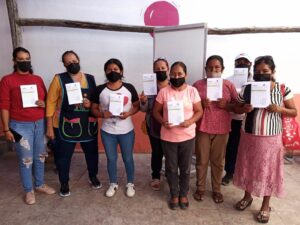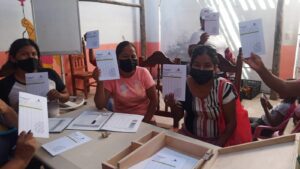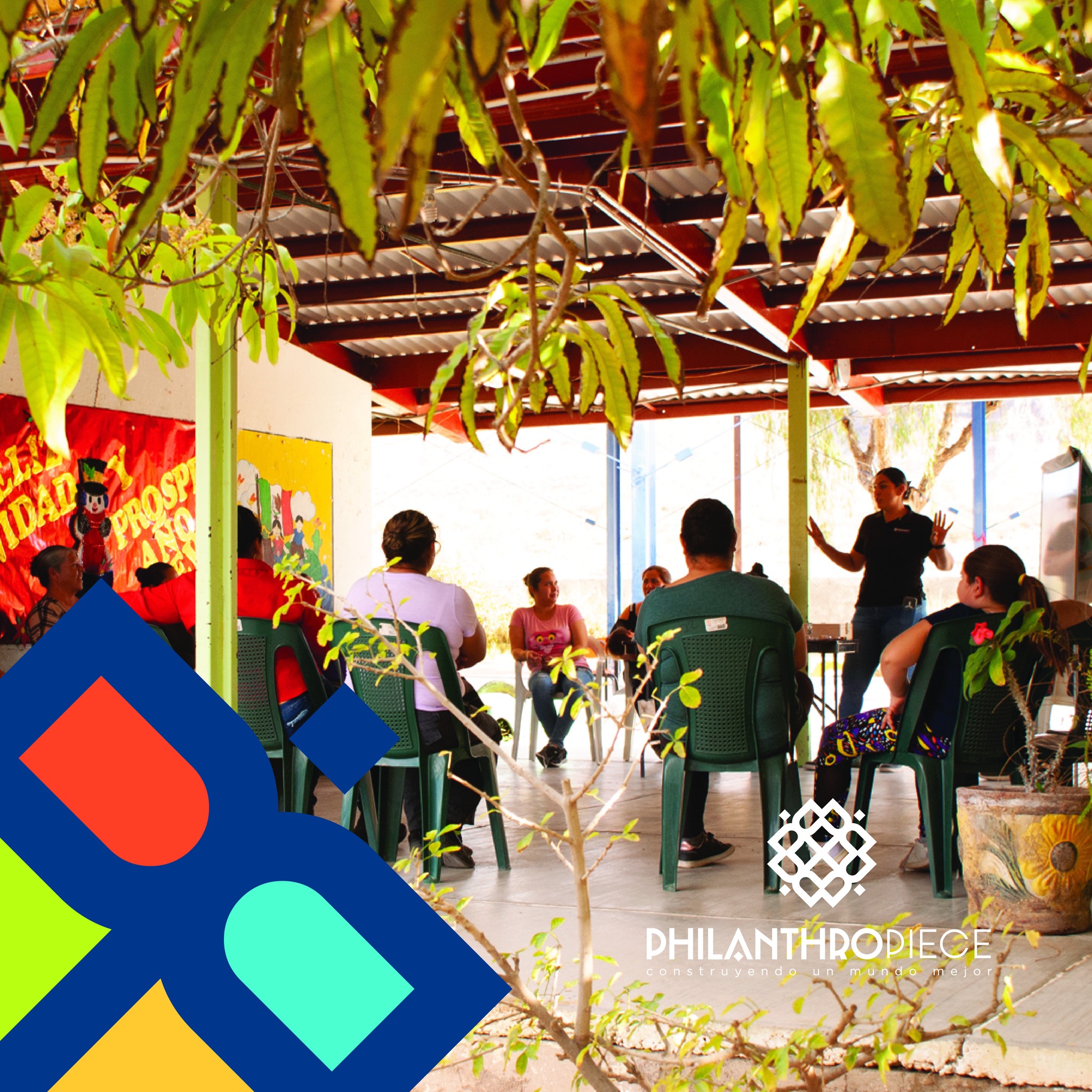Para leer este artículo en español, por favor haga clic aquí.
Not much seems to intimidate Celia Roldán. When she first moved to Cabo San Lucas five years ago, she dove right into tackling some of the biggest challenges her new community faced. She saw children who were left alone in their homes because their parents were away working. Those same children often did not have enough to eat and did not have educational assistance with homework and class materials. So Celia started a small support group for these children.
“I started under a tree, with a group of eight children. We didn’t even have tables or chairs. From there, the word began to spread about our work,” says Celia.
Through her work in the community, she discovered la Alianza para la Seguridad Alimentaria de Baja California Sur (ASA), which works to provide food access, as well as support trainings and resiliency programs, to low-income communities throughout Baja California Sur, Mexico. Celia signed up for a variety of trainings that ASA offered, all designed to help her gain more capacity as a community member and as a leader. One of the trainings that ASA offered Celia was participation in a Community Savings Group (CSG). The CSG was designed to include ASA clientele, like Celia, and was formed as a partnership between ASA and Philanthropiece A.C. Forming and developing Community Savings Groups has been at the heart of the work that Philanthropiece A.C. has done since it started working in Mexico. Collaborations like the one between ASA and Philanthropiece A.C. allow both organizations to broaden their work and the impact of their programming goals.
“When we talk about partnerships, we are talking about adding experiences, adding resources and it all contributes as it grows and grows in many ways. I am very convinced that there is no other way to change the world than through the sum of these alliances.” -Martha Márquez, Executive Director, Philanthropiece A.C.
“Partnerships help us to identify groups of people that other organizations are already working with. We can then go in directly to work with our methodology, we can share our resources and our expertise. This allows us to replicate our work in a more sustainable way,” says Martha Márquez, Executive Director of Philanthropiece A.C.
Christian Zavala, Program Coordinator for ASA, agrees and sees similar benefits for his organization.
“At ASA, we are looking for the most efficient way to reach our goals. There are many things we want to learn and develop inside ASA but we don’t want to reinvent the wheel. There is lots of knowledge and there are lots of other organizations that are doing things that we want to learn and apply and then possibly transform into what we need in our organization,” says Christian.

Members of the Community Savings Groups in Los Cabos, BCS, Mexico
The Community Savings Group opportunity that was offered to Celia was designed to maximize the energy and effort of both organizations. Philanthropiece A.C. wanted to reach more individuals who could benefit from its CSG trainings and ASA realized that its clientele could benefit from receiving programming around saving and financial education.
“Economics is a really big part of the challenge in vulnerable communities here in La Paz and Los Cabos. Philanthropiece is one of the partners that we identified as having a really good background in a topic that we were very interested in developing inside these vulnerable communities,” says Christian.
However, identifying a need in the community is just the beginning of a collaboration like this. There needs to be engagement from both organizations and sometimes, it can take time to build a relationship with new community members. For example, when ASA staff members approached Celia about getting involved with the CSG, Celia had a strong initial response.
“I thought, no, this may not work and it could cause problems. There are always problems when there is money and I don’t want to bother with all that,” says Celia.
For a woman like Celia, the idea of working with money, for herself and in a group of people, created a lot of uncertainties. This is understandable, says Christian Zavala.
“What we know is that some of the people living in these communities, they don’t find the need for it, they think their earnings are too little for savings. They are always worrying about how to make it happen with the money they have for today. And also, there is a lot of misconception about what a bank is and people can be distrusting of the idea of those types of organizations,” explains Christian.
In an effort to ease some of those concerns – including the overarching concern of how formal financial systems can be intimidating to low-income community members – Philanthropiece A.C. sent its own staff members to meet with Celia and ASA participants, to explain how the CSG Program would work. Taking the time and effort to meet with individuals and hear their concerns, to explain some of the details of the program, is where partnerships like this can thrive. Each organization can bring its skill set and knowledge, to communicate with individuals like Celia and offer them encouragement and support in the process.
“[The Philanthropiece team] came, Christian and Sofia from ASA came, and they explained to us what the purpose of creating a community savings group was. I continued with my doubts, but when I heard them, I agreed. They had an ease of connecting with us and giving us confidence. I think we were all satisfied after the talk and we said ‘We’ll take up the challenge and we’ll get into it’. I think it was the confidence they gave us by saying ‘You can do this,’” says Celia.
Sending Philanthropiece A. C. staff into the communities of partner organizations allows it to amplify its reach. It also allows Philanthropiece A.C. to learn from the organizations with which it is collaborating.
“I think it helps us in the programming, in the technical parts. But it also helps us learn from the challenges that other organizations face and the ways in which they work. I think it all adds up. When we talk about partnerships, we are talking about adding experiences, adding resources and it all contributes as it grows and grows in many ways. I am very convinced that there is no other way to change the world than through the sum of these alliances,” says Martha.
“When a woman is in control of her finances, she feels empowered, knowing that she can have money and she can manage it. It gives us a lot of security and changes our lives and the family environment.” -Celia Roldán, Community Organizer & Founder, Mariposas del Caribe
The CSG that Celia joined christened itself Las Mariposas del Caribe (Butterflies of the Caribbean). The group is now in its second savings cycle. It began with eight members, all women, and is now up to fifteen members, including some children. The women are especially excited about getting their children involved, since the children have the opportunity to learn things that many of the women never learned when they were younger. Children can learn from the successes that their

Members of the Community Savings Group Mariposas del Caribe meet for their weekly gathering.
mothers are having, and also establish good financial habits for the future. And the financial knowledge that the group members gain can ripple out into their family and their community.
“When a woman is in control of her finances, she feels empowered, knowing that she can have money and she can manage it. It gives us a lot of security and changes our lives and the family environment,” says Celia.
With successes like that, Celia and other community members are realizing the hope and possibility of collaborations like the one between Philanthropiece A.C. and ASA.
“This program with ASA has helped me. With the trainings and attention, it has given me the wings I needed so that I could help other families,” says Celia.
For more information about the work of Philanthropiece A.C. please click here.
Morning Glory Farr is an entrepreneur, journalist and also serves as an Advisory Board member of the Philanthropiece Foundation.

